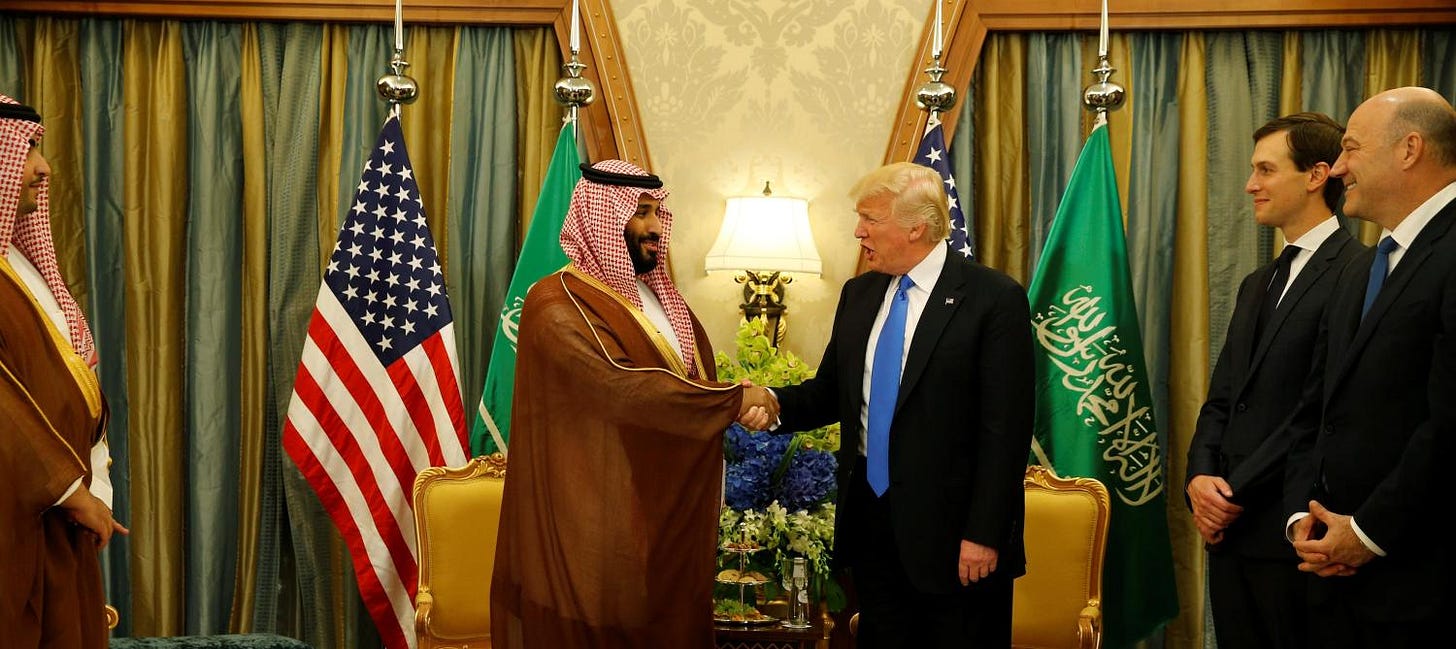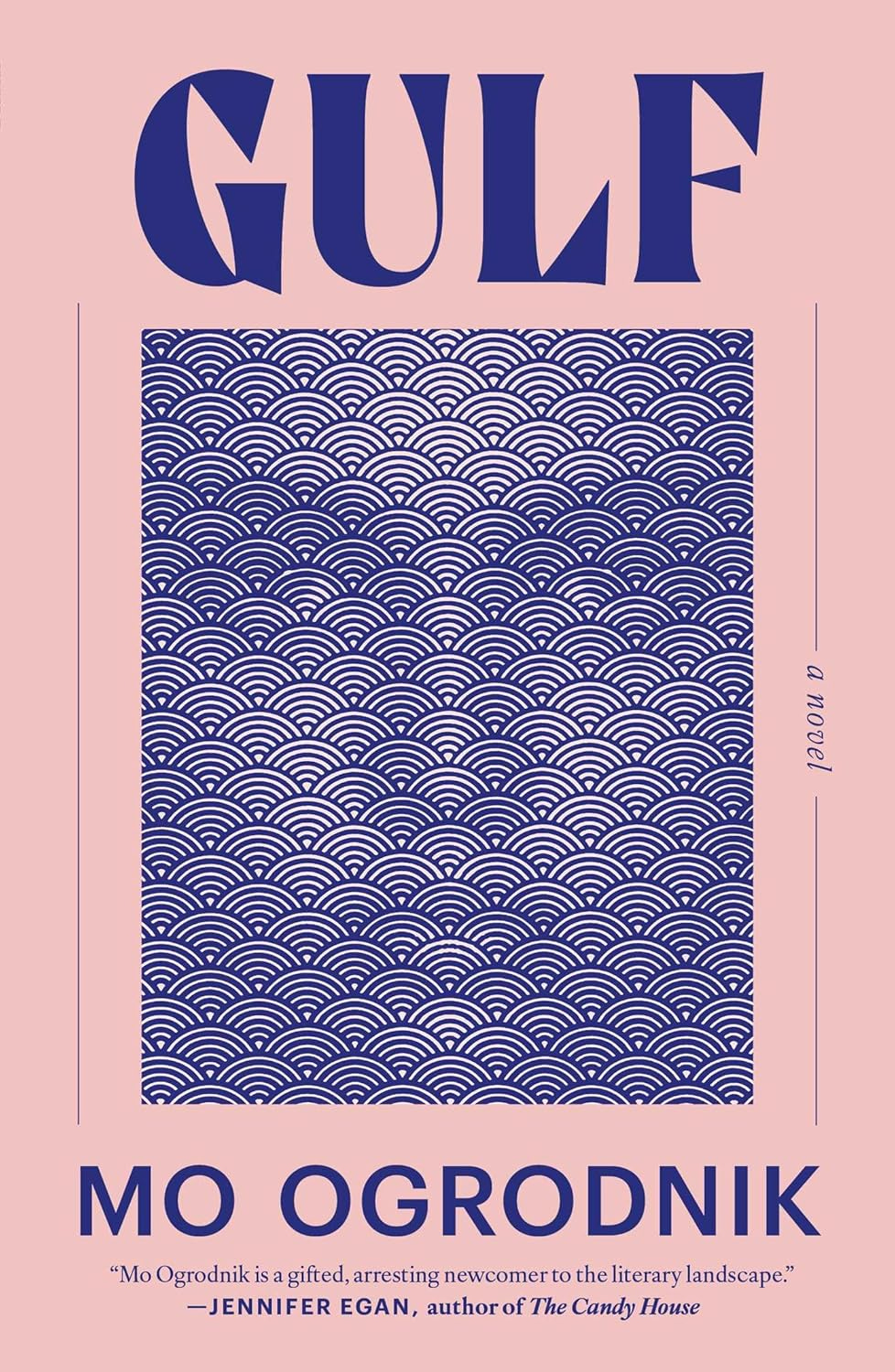The Gulf Nashra Weekly Digest
MBS Heads to Washington, UAE–Sudan Tensions Rise, and a Gulf-Themed Cinematic Novel.
Media Coverage
Geopolitics
“Before talks with Trump, Saudi Arabia doubles down on terms for Israel ties.” Reuters, November 10, 2025.
“Riyadh has signalled to Washington through diplomatic channels that its position has not changed: it will sign up only if there is agreement on a roadmap to Palestinian statehood, two Gulf sources told Reuters.”
Go Deeper: “Scoop: Israel wants Trump to condition F-35 sale to Saudi Arabia on Israel normalization.” Axios, November 15, 2025.
“Saudi Arabia, Egypt Stress Importance of Launching ‘Comprehensive Political Process’ in Sudan.” Asharq Al-Awsat, November 15, 2025.
“A quartet, comprised of Saudi Arabia, Egypt, the United Arab Emirates and United States, is working on reaching a ceasefire in Sudan. They met in Washington in September, stressing the need to exert “all possible efforts” to resolve the conflict.”
Go Deeper: “Sudan’s War: The Failure of Mediation and the Struggle for Civilian Rule.” Arab Center in Washington DC, October 31, 2025.
“Saudi Arabia to bolster trade with Lebanon after drug smuggling curbed.” Alarabiya, November 13, 2025.
“Easing controls on imports, banned for years by Saudi Arabia, would be a first tangible sign of improvement, although Riyadh still wants to see the weak central government of Lebanon disarm Hezbollah – a demand Hezbollah has so far rejected.”
Go Deeper: “Lebanon: How Israel, Hezbollah, and Regional Powers Are Shaping Its Future.” Council on Foreign Relations, January 27, 2025.
“Saudi defense minister meets top US officials at White House ahead of MBS visit.” Alarabiya, November 11, 2025.
“The talks come ahead of Saudi Crown Prince Mohammed bin Salman’s official working visit to Washington on November 18. The Crown Prince is scheduled to meet US President Donald Trump, who made Saudi Arabia his first foreign destination during both his first and second terms in office.”
Market & Economy
“GCC real GDP hits $466.2bn in Q1, up 3.1% year on year.” Arab News, November 2, 2025.
“Non-oil activities accounted for 73.2 percent of the GCC’s real GDP by the end of the first quarter of 2025, while oil activities held the remaining 26.8 percent share, news agency WAM reported, citing data from the Statistical Center for the Cooperation Council for the Arab States of the Gulf, or GCC-Stat.”
Go Deeper: “Gross Domestic Product (GDP) In GCC countries: First Quarter 2025.” GCC-STAT, September 2025. [PDF].
“GCC approves ‘one-stop’ travel system: UAE and Bahrain to pilot December roll-out.” Gulf News, November 12, 2025.
“Under the plan, the UAE and Bahrain will act as the first participating countries, applying the system to air travel between the two states. If the pilot proves successful, the travel-clearance model will be expanded to all six GCC member states, including Saudi Arabia, Oman, Qatar and Kuwait.”
“Qatar, Japan launch $2.5bn private equity fund to deepen economic ties.” Arab News, November 11, 2025.
“The fund will invest in Japanese companies, primarily targeting corporate transfers, privatizations of listed firms, and spin-offs through the separation or divestment of subsidiaries or business divisions. Individual investments could reach 30 billion yen ($200 million).”
“Saudi Arabia and US to kick off investment forum in Washington amid MBS visit.” Alarabiya, November 13, 2025.
“The investment forum, which will be held at the John F. Kennedy Center for the Performing Arts, is being organized by the Ministry of Investment of Saudi Arabia and the US–Saudi Business Council, according to US media reports.”
Go Deeper: “Here’s Everything We Know About Trump’s Financial Ties To Saudi Arabia.” Forbes, November 14, 2025.
Domestics
“Oman grants citizenship to 45 individuals under new Omani Nationality Law.” Gulf News, November 2, 2025.
“The recent implementation of the Omani Nationality Law under Royal Decree No. 17/2025, replaces the previous nationality law enacted under Royal Decree No. 38/2014, and came into effect on February 2, 2025.”
“Kuwait eyes large-scale battery storage to ease power crisis.” Arab News, November 10, 2025.
“The Public-Private Partnership Authority invited bids in September for the first phase of Al-Khairan, which will contribute at least 1.8 gigawatts. The first phase of Shagaya, with a planned capacity of 1,100 megawatts, has completed its pre-qualification stage.”
“Saudi Arabia Raises Military Spending Localization to 24.89%.” Asharq Al-Awsat, November 11, 2025.
“According to information shared during the meeting, six framework agreements have been implemented with relevant entities, resulting in purchase orders worth 2.8 billion riyals ($746 million) over four years. These covered areas such as ammunition, systems, equipment, communications, and military devices.”
Go Deeper: “Saudi Arabia Nears Quarter of Defense Spending Localized, Aims for 50% by 2030.” The Defense Post, November 11, 2025.
“Completion of 14 major national projects with a total investment value exceeding 450 million Omani rials.” Oman News Agency, November 15, 2025.
“It included the construction of a transport network linking the stations to several wilayats, along with strategic reservoirs and pumping stations. The total cost exceeded 408 million Omani rials, and the project generated more than 112 million Omani rials in local value through contracts with local companies and suppliers, including over 44 million rials directed to small and medium enterprises. The project also provided 698 direct job opportunities for Omanis.”
Go Deeper: “Oman’s Fiscal Reform: How a Gulf Nation is strengthening its public finances.” World Bank Blogs, November 13, 2025.
Gulf Opinions
This week Gulf commentators concentrated on the Sudanese crisis, particularly as claims and rumors about alleged Emirati involvement continued to circulate. The UAE Ministry of Foreign Affairs confirmed “the completion of investigations into the case of smuggling military equipment to the Port Sudan authorities and the referral of the accused to the judiciary,” while Emirati writers stressed that such narratives distort the reality of the conflict. Abdullah Al-Hashemi reiterated that the Sudan war is a domestic struggle in which the UAE has neither interest nor benefit, noting that “the UAE was not a party to the war, did not carry weapons in it, and never sought influence amid the rubble of Sudanese cities… and much of the directed hostility comes not from inside Sudan but from Muslim Brotherhood networks that thrive on incitement and chaos.” Moza Al-Abbar addressed a second wave of misinformation claiming the UAE seeks Sudan’s gold, arguing that with the UAE already among the world’s largest gold hubs—handling up to 30 percent of globally traded gold—such accusations are implausible and part of a deliberate smear campaign. Mohammed Khalfan Al-Sawafi added that those attacking the UAE have done nothing to prevent Sudan’s fragmentation or protect its civilians, while the UAE continues urging both generals to negotiate and supporting the international quartet, insisting that Sudan’s war can only end through political will and dialogue because it is a conflict “in which everyone loses.” Emirati academic Abdulkhaleq Abdulla went further, describing “the Sudanese Army, led by the Port Sudan Authority,” as “an unpatriotic army, and whoever supports it—whether in thought, money, or arms—is complicit in its crimes.”
From Kuwait, Dr. Faisal Al-Shareefi raised difficult questions about why the international community delayed engaging with the US-proposed ceasefire, why the Rapid Support Forces accepted it so quickly while the army refused, and whether atrocities such as those in Al-Fashir and the sudden rise of Abdullah Idris point to attempts to impose a new reality that edges Sudan toward another division. He argued that Sudanese blood has become “cheap” for actors pursuing personal or ideological interests, and that Abdullah Idris, known as “Abu Lulu,” is merely a pawn committing atrocities to frame the conflict as a civil war and justify partition. Finally, Saudi newspaper Asharq Al-Awsat published an analysis by Kuwaiti academic Dr. Mohammed Al-Rumaihi, who placed Sudan’s tragedy within a wider regional pattern. He contended that many Arab states never built modern institutional foundations and instead treated power as personal or sectarian property, producing coups, weakening law, and eroding citizenship. This structural failure, he argued, drove sub-state groups toward imagined grievances or external patrons, ultimately contributing to the collapse of regimes from Saddam Hussein to Gaddafi, Bashir, and Ali Abdullah Saleh—echoing the deeper institutional void now visible in Sudan’s ongoing crisis.
Picks
Book: Mo Ogrodnik “Gulf: A Novel” Simon & Schuster, May 6, 2025.
Analysis: “The New Identity of “Zayed’s Children”: UAE Football’s Second Wind.”Raphaël Le Magoariec, Arab Gulf States Institute in Washington, November 13, 2025.
Analysis: “In Washington, Mohammed bin Salman Aims to Elevate Defense Ties.” Aziz Alghashian, Arab Gulf States Institute in Washington, November 12, 2025.
Analysis: “LNG Heavyweights Qatar and U.S. Take Aim at EU Directive.” Kate Dourian, Arab Gulf States Institute in Washington, November 12, 2025.
Analysis: “Four Priorities for Mohammed bin Salman in Washington.” Kristin Smith Diwan, Hussein Ibish, and Robert Mogielnicki, Arab Gulf States Institute in Washington, November 12, 2025.
Analysis: “Memo: MBS Comes to Washington.” Daniel Benaim, Middle East Institute, November 7, 2025.
Analysis: “UAE Connectivity as a Platform for Resilient Growth.” Kristian Alexander, ORF Middle East, November 12, 2025.
Analysis: “The Gulf’s Indo-Pacific Dilemma.” Lillian Aronson, ORF Middle East, November 12, 2025.
Analysis: “A New Path to Middle East Security.” James Jeffrey and Elizabeth Dent, Foreign Affairs, November 13, 2025.
Analysis: “Shifting Global Dynamics, Steady U.S.-Saudi Ties.” Amnah Mosly, Gulf Research Center, November 13, 2025.
Analysis: “The Normalization Narrative: A Misleading Interpretation of Saudi–U.S. Relations.” Saleh Al-Khathlan, Gulf Research Center, November 9, 2025.
Analysis: “Perspectives on Muhammad bin Salman’s Visit to Washington.” Dennis Ross, Elizabeth Dent, April Longley Alley, Simon Henderson, Henry Tugendhat, Noam Raydan, The Washington Institute for Near East Policy, November 14, 2025.
Analysis: “From Pariah to Partner, MBS Returns to Washington.” Dana Stroul, The Washington Institute for Near East Policy, November 14, 2025.
Analysis: “How the US can balance Qatar’s mediation role with the fight against terrorist financing.” Lesley Chavkin, Atlantic Council, November 13, 2025.
Analysis: “Israel, the UAE, and Yemen’s South: The Politics of Unlikely Alliances.” Giorgio Cafiero, Arab Center in Washington, November 14, 2025.
Podcast: “Inside the Gulf Property Boom.” Hassan Jivraj hosts Faisal Durrani, Majlis & Markets, November 10, 2025.



